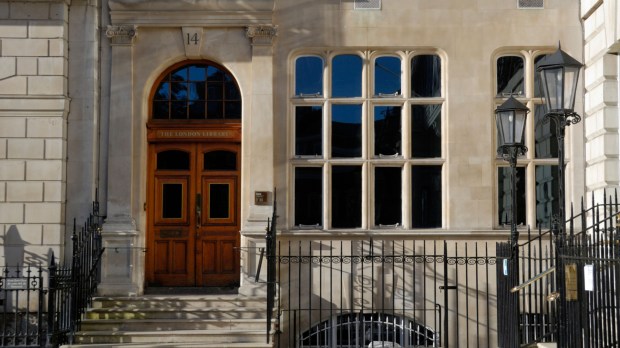As we get back into Roe vs Wade, prompted by the leak of what is said to be the US Supreme Court’s draft decision to throw out that famous judgment, prepare for an avalanche of misinformation. On BBC Radio 4 on Tuesday, the news said that the court’s 1973 decision had ‘legalised abortion’. Not so. Abortion had long been legal in many states of the Union. But until the judgment, different states had been free to adopt different policies. Roe vs Wade decided that within the 14th Amendment to the Constitution and its implied right to privacy lay a constitutional right to abortion and that the amendment’s ‘due process’ clause prevented any state from abridging that right. Critics at the time argued that this discovery of abortion rights (which, like privacy itself, are not mentioned in the amendment) was, to put it mildly, a stretch. Obviously much of the heat in the argument, then and now, depends on what you think about abortion. But the actual issue for the court is about what the Constitution means and, as so often in the United States, about states’ rights. You could therefore, in principle, be in favour of abortion, but against the Roe vs Wade judgment, or indeed – though that would be harder – the other way round. The one thing certain is that overturning Roe vs Wade, though undoubtedly a momentous decision, would not banish abortion from America.
Having been on holiday in Naples at the time, I missed the excitements about Angela Rayner’s legs in parliament, the Mail on Sunday, Mr Speaker, Neil Parish’s erratic search for tractors online etc and cannot be confident about who has said what. So forgive me if I am going over old ground, but the bit about Ms Rayner’s legs seems questionable. If you sit where the Prime Minister sits on the front bench, you are separated from the legs of Ms Rayner, and, indeed, those of Sir Keir Starmer and the entire opposition front bench, by the solid table on which the despatch box rests. Even when you stand to speak, I doubt if you have an unimpeded view of any front-bench Labour legs. So isn’t the story based on a false premise?
In the wake of Mr Parish’s difficulties, it is suggested that mobile phones be banished from the Chamber. Why can’t MPs listen to the debate instead, people ask. This sounds reasonable but ignores a couple of realities. One is that nowadays mobiles are a multiple and primary means of communication and information, whereas letters no longer are. The reading and even writing of letters in the Chamber have always been allowed. An MP listening to a debate often wants to use his phone to check a fact, look up a speaker, communicate with his/her whip or a minister or a backbench colleague, concert tactics and impart or receive the latest news. The other is that, by sensible convention, those wishing to speak in a debate must sit through most of it, a process which can take hours. It is not practical to cage a Member of Parliament in the Chamber for long periods without means of exterior communication, and it is not humane to expect him to listen to every word uttered while he sits there. If denied all external links, he/she will be even less likely to sit in the Chamber than at present.
I found Naples, which I last visited about 30 years ago, still pleasantly anarchic, if slightly less menacing. Parents whizz round on scooters, their unhelmeted infants wedged beside them. St Januarius still liquefies (or doesn’t). Astonishing baroque staircases are still half-concealed and unrestored in slummy former palazzi. The streets round Spaccanapoli, in the heart of the city, still sell almost any gewgaw or presepe (the distinctive Neapolitan Nativity scenes) imaginable. I bought a roll of lavatory paper with a picture of President Putin on it and the words ‘Putin: puzza di merda’. I was rather dismayed, however, to discover that one could buy a similar roll with the same legend against a picture of President Zelensky of Ukraine. Italy is one of those Nato allies trying to face both ways in this world crisis.
We also went to the opera where the Ukrainian soprano Oksana Dyka was cheered and cheered as Tosca. The Teatro San Carlo has unusual boxes which rise sheer from floor to ceiling and wrap the whole three sides of the auditorium. Inside each box is a mirror, whose reflection looks away from the stage. I asked an official why. ‘In the days of the King,’ he said, ‘no one could laugh at anything on stage until the King laughed. If you looked in the mirror, you could see whether he was laughing in the royal box.’ I wonder if our own dear opera boxes ever had mirrors to check whether Queen Victoria was amused.
One of our most charming visits was to La Mortella, the garden planted on a volcanic hillside in Ischia by Susanna, the wife of the composer William Walton. Our party was granted a private visit, so we avoided Sissinghurst-style queues, but there was one other presence – an exotic group filming videos of the latest scent by Guerlain. This would be promoted online, our Italian host explained, by people she pronounced as ‘influenzas’. How right she is. Her pronunciation aptly expresses the influencer infection running through entire populations of young people who have not yet built up herd immunity.
As you get off the plane at Gatwick (and other airports) you have to run the gauntlet of righteous HSBC advertisements. During the Brexit period, the ads defiantly declared, ‘We are not an island’. These eventually came down. Now the theme is inclusion and the slogan is ‘Together we thrive’. This phrase has always sat uneasily with HSBC’s deference to China, one of the least inclusive countries in the world. Now, as its Chinese investor, Ping An, wants to break the bank up into its Chinese and non-Chinese parts, it is laughable.
Got something to add? Join the discussion and comment below.
Get 10 issues for just $10
Subscribe to The Spectator Australia today for the next 10 magazine issues, plus full online access, for just $10.
You might disagree with half of it, but you’ll enjoy reading all of it. Try your first month for free, then just $2 a week for the remainder of your first year.















Comments
Don't miss out
Join the conversation with other Spectator Australia readers. Subscribe to leave a comment.
SUBSCRIBEAlready a subscriber? Log in